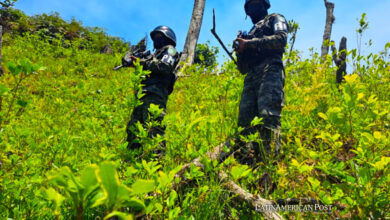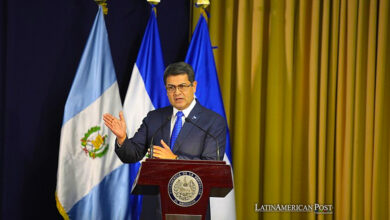Honduras’ Shift in Diplomacy Amidst Gaza Conflict
Honduras has joined a cohort of Latin American nations in recalling its ambassador to Israel, a firm rebuke to the intensifying military actions in the Gaza Strip. This move underscores a significant policy shift, emphasizing human rights and aligning with regional leftist governance.

Photo: 07/10/2023.- Israeli fighter jets attack the Palestinian Tower. EFE/ Mohammed Saber
The Latin American Post Staff
Listen to this article
Leer en español: El cambio de diplomacia de Honduras en medio del conflicto de Gaza
Honduras Takes Bold Diplomatic Stand
In an assertive diplomatic maneuver, Honduras has recalled its ambassador to Israel, signaling a staunch condemnation of the ongoing hostilities in the Gaza Strip and the resulting humanitarian impact.
Amid escalating violence in the Gaza Strip, Honduras has become the latest nation in Latin America to withdraw its ambassador from Israel, denouncing what it terms as 'genocide' and severe breaches of international law against the Palestinian population. This bold step reflects an emerging trend among leftist governments in the region to express solidarity with Palestinians through diplomatic channels.
President's Announcement: A Response to Humanitarian Crisis
Eduardo Enrique Reina, Honduras' Foreign Minister, took to social media platforms to announce President Xiomara Castro's decision to recall the Honduran ambassador. This response is driven by the deteriorating humanitarian conditions faced by civilians in Gaza, as witnessed by the international community.
The move by Honduras aligns with actions taken by other leftist-led Latin American countries, such as Bolivia, which severed diplomatic ties with Israel, condemning its actions as 'crimes against humanity.' Additionally, Chile and Colombia have also recalled their ambassadors, expressing criticism of Israel's military offensive.
Human Toll: Calls for Cease-fire
The conflict has resulted in a staggering number of casualties, with the Palestinian Ministry of Health reporting over 9,000 deaths. On the Israeli side, the conflict's toll is also profound, with significant loss of life and the abduction of citizens by Hamas militants, sparking international concern and calls for a cessation of hostilities.
Reina's discussion with the Associated Press emphasized that withdrawing the ambassador aims to spotlight the civilian crisis in Gaza. He clarified that this act does not sever relations with Israel; Honduran embassy operations will continue with the remaining diplomatic staff.
Highlighting the essence of a recent United Nations resolution, Reina called for an immediate cease-fire and respect for humanitarian laws. The solution also advocates for initiating dialogue to forge a pathway to peace, underscoring the international community's concern for non-combatant populations affected by the conflict.
A Shift in Diplomatic Course
Honduras' current diplomatic pivot is in stark contrast to its previous administration's stance. In 2021, under the leadership of President Juan Orlando Hernández, Honduras relocated its embassy to Jerusalem, a move widely interpreted as an overture to the Trump administration, which had similarly moved the U.S. embassy to the contested city.
The relocation was controversial, reflecting a broader geopolitical play rather than directly aligning with the region's peace aspirations. Hernández's decision was part of a broader strategy to gain favor with the United States. Still, his tenure concluded amidst charges of drug trafficking, leaving a complex legacy for his successor.
President Castro, representing a shift in the nation's political spectrum, has inherited the challenge of navigating a nuanced foreign policy. Her administration's stance on the Israeli-Palestinian conflict illustrates an effort to align with the leftist governments in the region, like those of Venezuela and Cuba, while maintaining a delicate balance in its relationship with the United States.
Also read: Diplomatic Tensions Escalate: Latin American Nations Criticize Israel's Gaza Operations
Honduras' Diplomatic Recalibration
This recalibration of diplomatic posture by Honduras underscores the intricate web of international relations and the heightened sensitivity of Latin American countries to human rights issues. It is a testament to the region's growing voice in global affairs and willingness to take principled stances, even at the potential cost of straining traditional alliances.
As Honduras reassesses its diplomatic strategies, the unfolding situation in the Middle East continues to test the international community's resolve to champion peace and human dignity. The world watches as these countries, traditionally not at the forefront of Middle Eastern politics, assert their influence and call for reevaluating policies and alliances in the face of humanitarian crises.




